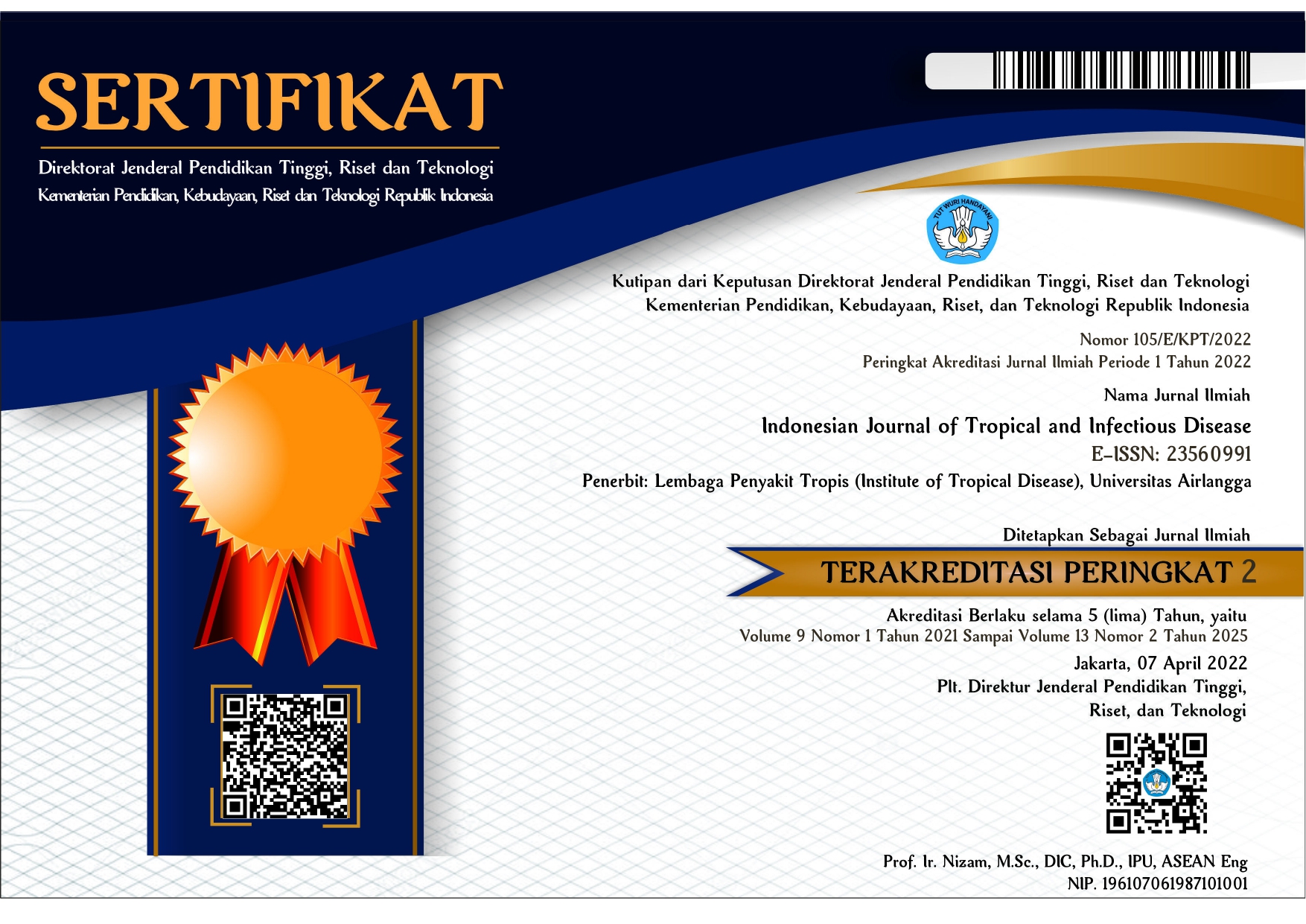Effect of Immunization of The Pili Protein 65.5 kDa Klebsiella pneumoniae on IFN-γ Levels of Spleen BALB/c Mice
Downloads
Klebsiella pneumoniae is a Gram-negative bacterium that poses a threat to the global community. Currently, no vaccine for K. pneumoniae is licensed by the Food and Drug Administration (FDA). The delay in the manufacture of the K. pneumoniae vaccine was because many vaccine candidates failed at the clinical trial stage due to adverse cross-reactions. Pili can be used as a choice as a vaccine candidate. Pili K. pneumoniae is an immunogenic substance that triggers an immune response, one of which is the cytokine IFN-γ. Splenic splenocytes are the main source of IFN-γ-producing cells. The aim of this study is to determine the effect of immunization pili protein 65.5 kDa K. pneumoniae on IFN-γ levels from spleen BALB/c mice. There were 3 groups, K1 as control given PBS, K2 given pili protein 65.5 kDa + adjuvant, and K3 given adjuvant. IFN-γ was then measured by the ELISA method and analyzed by the ANOVA test. The results of measuring IFN-γ levels using One-way ANOVA showed that the total for all groups was 243.50 ± 43.7 with p < 0.05, the Post Hoc LSD test was continued. The Post Hoc test showed significant differences between K1 control and K2 groups, and between K1 and K3 groups, but not between K2 and K3 groups. It can be concluded that immunization with 65.5 kDa of pili protein does not affect the increase in IFN-γ levels in the spleen of BALB/c mice.
World Health Organization (WHO). Antimicrobial resistance: global report on surveillance. https:// apps.who.int/iris/bitstream/handle/10665/112642/9789241564748_eng. pdf. Published June 2014. Accessed September 15, 2022.
Wyres, K. L. and K. E. Holt. Klebsiella pneumoniae population genomics and antimicrobial-resistant clones. Trends in Microbiology. 2016;24(12):944–956.
Perhimpunan Dokter Paru Indonesia (PDPI). Panduan Umum Praktik Klinis Penyakit Paru dan Pernapasan. Jakarta: Perhimpunan Dokter Paru Indonesia; 2021:26–35
Riskesdas. National Riskesdas 2018 Report. Jakarta: Balitbangkes; 2018: 73–77.
Choi, M., S. M. Tennant, R. Simon, and A. S. Cross. Progress towards the development of klebsiella vaccines. Expert Review of Vaccines. 2019;18(7):681–691.
Arato, V., M. M. Raso, G. Gasperini, F. B. Scorza, and F. Micoli. Prophylaxis and treatment against Klebsiella pneumoniae: current insights on this emerging anti-microbial resistant global threat. International Journal of Molecular Sciences. 2021;22(8):1–20.
Paczosa, M. K. and J. Mecsas. Klebsiella pneumoniae: going on the offense with a strong defense. Microbiology and Molecular Biology Reviews. 2016;80(3):629–661.
Agustina, D., D. C. Mufida, and N. I. Saffanah. Immunodetection of adhesin pili protein 38.6 kDa k. pneumoniae using western blot. Elkawnie : Journal of Islamic Science and Technology. 2021;7(2):317–327.
Cheng, J., J. Zhang, B. Han, H. W. Barkema, E. R. Cobo, et al. Klebsiella pneumoniae isolated from bovine mastitis is cytopathogenic for bovine mammary epithelial cells. Journal of Dairy Science. 2020;103(4):3493–3504.
Van Lieshout, M. H. P., S. Florquin, C. Van't Veer, A. F. De Vos, et al. TIR-domain-containing adaptor-inducing interferon-β (trif) mediates antibacterial defense during gram-negative pneumonia by inducing interferon-γ. Journal of Innate Immunity. 2015;7(6):637–646.
Abbas, A., A. Litchman, and S. Pillai. Basic Immunology Abbas: Functions and Disorders of The Immune System. 5th ed. Singapore: Elsevier; 2016: 192–204
Podmirseg, S. R., H. Jäkel, G. D. Ranches, M. K. Kullmann, et al. Caspases uncouple p27kip1 from cell cycle-regulated degradation and abolish its ability to stimulate cell migration and invasion. Oncogene. 2016;35(35):4580–4590.
Care, I. A. dan U. Committee. Policy for adjuvant use with special emphasis on complete Freund's adjuvant. UNMC Animal Care and Use Program. 2014;1–8.
Greenfield, E. A. Immunizing mice and rats with nitrocellulose-bound antigen. Cold Spring Harbor Protocols. 2019;2019(12):768–770.
Ramsugit, S., B. Pillay, and M. Pillay. Evaluation of the role of Mycobacterium tuberculosis pili (MTP) as an adhesin, invasin, and cytokine inducer of epithelial cells. Brazilian Journal of Infectious Diseases. 2016;20(2):160–165.
Udin, M. F., W. Barlianto, and H. M. S. C. Kusuma. Increasing Expression of IFN-γ Lung Mice Induced with Mycobacterium Tuberculosis Adhesin 38-Kda Protein and Oral ISCOM. Medical Journal of Brawijaya. 2014;28(1):11–16.
Lee, W. H., H. Il Choi, S. W. Hong, et al. Vaccination with Klebsiella pneumoniae-derived extracellular vesicles protects against bacteria-induced lethality via both humoral and cellular immunity. Experimental and Molecular Medicine. 2015;47(9):1–9.
Zargaran, F. N., A. Akya, S. Rezaeian, et al. B cell epitopes of four fimbriae antigens of klebsiella pneumoniae: a comprehensive in silico study for vaccine development. International Journal of Peptide Research and Therapeutics. 2021;27(2):875–886.
Gangaplara, A., C. Massilamany, N. Lasrado, D. Steffen, and J. Reddy. Evidence for anti-viral effects of complete Freund's adjuvant in the mouse model of enterovirus infection. Vaccines. 2020;8(3):1–9.
Sigma-Aldrich. Freund's adjuvant, complete and incomplete (f5881). 2022;1–2.
Hanifah, N. and E. Darmawan. The Anti-Inflammatory Effects of Chitosan of Shrimp Shell of Trisik Coastal in Rheumatoid Arthritic Rats Model. Pharmaciana. 2015;5(2):177–184.
Ayu, S. The Effect of Pili Protein of Klebsiella pneumoniae on Enhanced IFN-Gamma Levels in Mice Liver. Thesis. Jember: Faculty of Medicine Jember University; 2022.
Suardana, I. B. K. Basic Immunology of the Immune System. Denpasar: Udayana University; 2017:26–31.
Martínez-Orellana P, González N, Baldassarre A, Álvarez-Fernández A, et al. Humoral responses and ex vivo ifn-γ production after canine whole blood stimulation with leishmania infantum antigen or kmp11 recombinant protein. Veterinary Sciences. 2022;9(3):1–10.
Apostólico, J. de S., V. S. L. Alves, F. C. Coirada, S. B. Boscardin, and D. S. Rosa. Adjuvants: classification, modus operandi, and licensing juliana. Journal of Immunology Research. 2016:1–16.
Copyright (c) 2024 Indonesian Journal of Tropical and Infectious Disease

This work is licensed under a Creative Commons Attribution-NonCommercial-ShareAlike 4.0 International License.
The Indonesian Journal of Tropical and Infectious Disease (IJTID) is a scientific peer-reviewed journal freely available to be accessed, downloaded, and used for research. All articles published in the IJTID are licensed under the Creative Commons Attribution-NonCommercial-ShareAlike 4.0 International License, which is under the following terms:
Attribution ” You must give appropriate credit, link to the license, and indicate if changes were made. You may do so reasonably, but not in any way that suggests the licensor endorses you or your use.
NonCommercial ” You may not use the material for commercial purposes.
ShareAlike ” If you remix, transform, or build upon the material, you must distribute your contributions under the same license as the original.
No additional restrictions ” You may not apply legal terms or technological measures that legally restrict others from doing anything the license permits.























